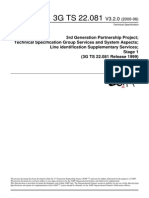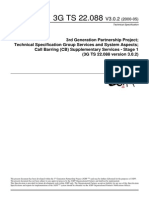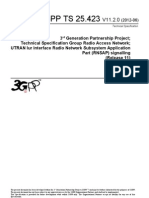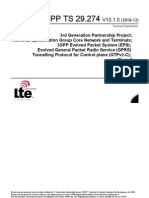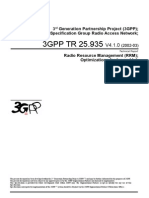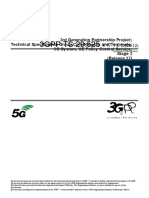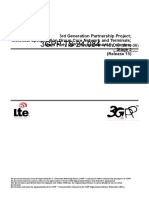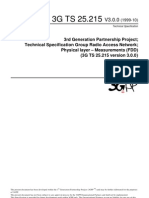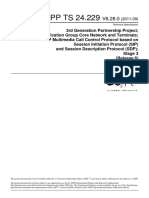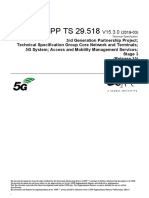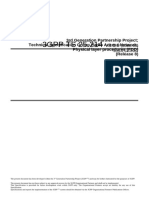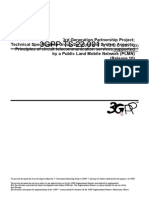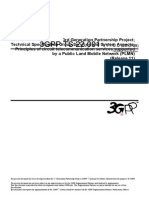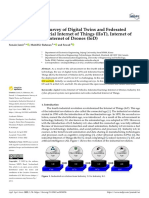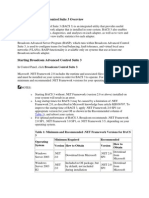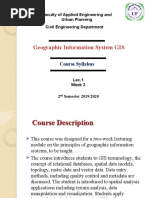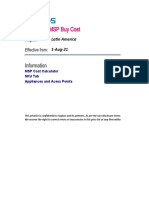3GPP TS 22.097
3GPP TS 22.097
Uploaded by
santanameroCopyright:
Available Formats
3GPP TS 22.097
3GPP TS 22.097
Uploaded by
santanameroOriginal Title
Copyright
Available Formats
Share this document
Did you find this document useful?
Is this content inappropriate?
Copyright:
Available Formats
3GPP TS 22.097
3GPP TS 22.097
Uploaded by
santanameroCopyright:
Available Formats
3GPP TS 22.097 V3.2.
0 (2000-10)
Technical Specification
3rd Generation Partnership Project;
Technical Specification Group Services and System Aspects;
Multiple Subscriber Profile (MSP) Phase 1;
Service description - Stage 1
(Release 1999)
The present document has been developed within the 3rd Generation Partnership Project (3GPP TM) and may be further elaborated for the purposes of 3GPP.
The present document has not been subject to any approval process by the 3GPP Organisational Partners and shall not be implemented.
This Specification is provided for future development work within 3GPP only. The Organisational Partners accept no liability for any use of this Specification.
Specifications and reports for implementation of the 3GPP TM system should be obtained via the 3GPP Organisational Partners' Publications Offices.
Release 1999
3GPP TS 22.097 V3.2.0 (2000-10)
Keywords
UMTS, GSM, supplementary service, MSP,
stage 1
All rights reserved.
3GPP
Postal address
3GPP support office address
650 Route des Lucioles - Sophia Antipolis
Valbonne - FRANCE
Tel.: +33 4 92 94 42 00 Fax: +33 4 93 65 47 16
Internet
http://www.3gpp.org
Copyright Notification
No part may be reproduced except as authorized by written permission.
The copyright and the foregoing restriction extend to reproduction in all media.
2000, 3GPP Organizational Partners (ARIB, CWTS, ETSI, T1, TTA,TTC).
3GPP
Release 1999
3GPP TS 22.097 V3.2.0 (2000-10)
Contents
Foreword............................................................................................................................................................ 5
1
Scope ....................................................................................................................................................... 6
References ............................................................................................................................................... 6
Definitions and abbreviations.................................................................................................................. 6
3.1
3.2
4
4.1
5
5.1
5.1.1
5.1.2
5.1.3
5.1.4
5.1.5
5.2
5.2.1
5.2.2
5.2.3
5.2.4
5.2.5
5.2.6
5.3
5.3.1
5.3.2
5.3.3
5.3.4
5.4
5.4.1
5.4.2
5.4.3
5.4.4
6
6.1
6.2
6.3
6.4
6.5
6.6
6.7
6.8
6.9
6.10
6.11
6.12
7
7.1
7.2
7.3
7.4
7.5
7.6
Definitions..........................................................................................................................................................6
Abbreviations .....................................................................................................................................................7
Description .............................................................................................................................................. 7
Applicability to telecommunication services .....................................................................................................7
Functional requirements .......................................................................................................................... 7
Handling of the MSP Service.............................................................................................................................7
Provision.......................................................................................................................................................7
Withdrawal ...................................................................................................................................................7
Activation .....................................................................................................................................................7
Deactivation..................................................................................................................................................7
Invocation .....................................................................................................................................................8
Handling of the Profile.......................................................................................................................................8
Provision.......................................................................................................................................................8
Withdrawal ...................................................................................................................................................8
Registration...................................................................................................................................................8
Selection .......................................................................................................................................................8
Erasure..........................................................................................................................................................8
Interrogation .................................................................................................................................................8
Normal operation with successful outcome .......................................................................................................9
Mobile Originating Calls ..............................................................................................................................9
Mobile Terminating Calls.............................................................................................................................9
Mobile Originating Call Independent Supplementary Service Activities.....................................................9
Call Related Supplementary Service Activities............................................................................................9
Exceptional procedures or unsuccessful outcome ..............................................................................................9
Roaming into networks not supporting MSP................................................................................................9
Registration or Selection of a profile that is already registered ....................................................................9
Registration or Selection of a non-provisioned profile.................................................................................9
Registration or Selection attempts where MSP is not provisioned .............................................................10
Interaction with supplementary services ............................................................................................... 10
Line Identification Services .............................................................................................................................10
Call Hold (HOLD) ...........................................................................................................................................10
Call Waiting (CW) ...........................................................................................................................................10
Call Forwarding ...............................................................................................................................................10
Multi Party Service (MPTY)............................................................................................................................10
Closed User Group (CUG) ...............................................................................................................................10
Advice of Charge (AoC) ..................................................................................................................................10
Call Barring......................................................................................................................................................11
Explicit Call Transfer (ECT)............................................................................................................................11
CCBS ...............................................................................................................................................................11
eMLPP .............................................................................................................................................................11
Multicall ...........................................................................................................................................................11
Interaction with other services............................................................................................................... 11
The Multi-Numbering Scheme.........................................................................................................................11
The Short Message Service ..............................................................................................................................11
Interactions with CAMEL................................................................................................................................12
Interactions with OR ........................................................................................................................................12
Operator Determined Barring...........................................................................................................................12
Roaming restrictions ........................................................................................................................................12
3GPP
Release 1999
3GPP TS 22.097 V3.2.0 (2000-10)
Cross-Phase Compatibility .................................................................................................................... 12
Annex A: Change history .............................................................................................................................. 13
History ............................................................................. !
3GPP
Release 1999
3GPP TS 22.097 V3.2.0 (2000-10)
Foreword
This Technical Specification has been produced by the 3GPP.
The contents of the present document are subject to continuing work within the TSG and may change following formal
TSG approval. Should the TSG modify the contents of this TS, it will be re-released by the TSG with an identifying
change of release date and an increase in version number as follows:
Version 3.y.z
where:
x the first digit:
1 presented to TSG for information;
2 presented to TSG for approval;
3 Indicates TSG approved document under change control.
y the second digit is incremented for all changes of substance, i.e. technical enhancements, corrections, updates,
etc.
z the third digit is incremented when editorial only changes have been incorporated in the specification;
3GPP
Release 1999
3GPP TS 22.097 V3.2.0 (2000-10)
Scope
The present document gives an overall view of how this service shall operate both in the PLMN and within the Mobile
Station (MS). This TS defines functionality and is not intended to constrain implementation.
References
The following documents contain provisions which, through reference in this text, constitute provisions of the present
document.
References are either specific (identified by date of publication, edition number, version number, etc.) or
non-specific.
For a specific reference, subsequent revisions do not apply.
For a non-specific reference, the latest version applies.
For this Release 1999 document, references to GSM documents are for Release 1999 versions (version 8.x.y).
[1]
GSM 01.04: "Digital cellular telecommunications system (Phase 2+); Abbreviations and
acronyms".
[2]
3GPP TS 22.004: "General on supplementary services".
[3]
3GPP TS 22.030: " Man-machine Interface (MMI) of the mobile station (MS)".
[4]
3GPP TS 23.040: "Technical realization of the Short Message Service (SMS) Point to Point (PP)".
[5]
3GPP TR 22.905: "Vocabulary for 3GPP Specifications".
[6]
3GPP TS 22.135: "Multicall".
Definitions and abbreviations
3.1
Definitions
For the purposes of this TS the following definitions apply:
Subscriber: The user who is provisioned with the MSP service
Profile: A profile consists of a set of telecommunications services for the subscriber. In the case of the single
numbering scheme there is a unique MSISDN associated with each profile. In the multi-numbering scheme there is the
ability to have a unique MSISDN associated with each basic service in each profile.
Service Provider (SP): The organisation through which the subscriber obtains PLMN telecommunication services.
This may be the network operator or possibly a separate body.
Profile Identification (Profile ID): The profile IDs allow unambiguous identification of each profile. This will allow
the subscriber to select the preferred profile for outgoing calls and for subscriber actions. For terminating calls the
profile ID shall be part of the notification of the profile.
Registered Profile: The registered profile is that registered by/for the subscriber
Selected Profile: For mobile originated calls and short messages this is the registered profile unless the subscriber
explicitly selects an alternative profile. For mobile terminating activities, this is the profile associated with the MSISDN
addressed.
3GPP
Release 1999
3GPP TS 22.097 V3.2.0 (2000-10)
Mobile Terminating Activities: These include mobile terminating calls, short messages (SMS MT) and Call
Independent Supplementary Services (e.g. NI-USSD).
Default Profile: Profile to be used when roaming to non-supporting network
3.2
Abbreviations
For the purposes of this TS the following abbreviations apply, in addition, abbreviations used in this TS are listed in
GSM 01.04 [1].
MSP
Multiple Subscriber Profile
Description
Multiple Subscriber Profile is an optional service to enable mobile subscribers to have several profiles associated with a
single IMSI, with each profile being a subscription option. Each profile may be used for mobile originated and mobile
terminated calls.
Up to four different profiles can be provisioned against a subscriber using the MSP feature. This will allow the
subscriber to separate her telecommunication service needs into different identities (e.g. business and home).
The charges accrued for services shall be associated with the appropriate profile, allowing separate charging for each
profile.
A supporting visited network shall indicate [on the billing record] for charging purposes the profile used.
4.1
Applicability to telecommunication services
The applicability of this supplementary service is defined in TS 22.004 [2].
Functional requirements
5.1
Handling of the MSP Service
This clause describes the normal procedures for the handling of the MSP service.
5.1.1
Provision
The MSP service shall be provided after prior arrangement with the service provider. If the MSP service is provisioned
for the subscriber at the first time the subscriber shall also be provisioned with at least two profiles.
5.1.2
Withdrawal
Withdrawal of the MSP service shall be done by either the service provider at the subscribers request or for
administrative reasons. The MSP service shall be withdrawn when there is only one profile remaining.
5.1.3
Activation
The MSP service is activated by the service provider as a result of provision.
5.1.4
Deactivation
The MSP service is deactivated by the service provider as a result of withdrawal.
3GPP
Release 1999
5.1.5
3GPP TS 22.097 V3.2.0 (2000-10)
Invocation
The MSP service is invoked by mobile originated and mobile terminating calls.
5.2
Handling of the Profile
This subclause describes the normal procedures for selecting the registered profile for mobile originated calls, short
messages and call independent supplementary service related activities. For mobile terminating activities the profile is
selected automatically by association with the MSISDN addressed.
5.2.1
Provision
The provision of profiles (up to a maximum of four) is provided by prior arrangement with the service provider. The
subscriber may select any provisioned profile on a per call basis or register one of them. The subscriber will nominate
one of their provisioned profiles as the default profile to be used when roaming to non-supporting networks. The
subscriber may subsequently nominate an alternative default (i.e. roaming) profile, nevertheless the default profile can
only be changed by the service provider.
5.2.2
Withdrawal
The Service Provider shall be able to withdraw profiles. The registered profile shall never be withdrawn, and
consequently if the registered profile needs to be withdrawn the service provider shall first register the subscriber onto
another profile.
5.2.3
Registration
Registration is the procedure by which information is written to the network to allocate a particular profile to be used
for all outgoing calls and supplementary service related activities. Registration to a profile shall take place either by the
service provider or with an appropriate control procedure by the subscriber as defined in TS 22.030 [3]. At all times
only one profile shall be registered. The network shall indicate to the user whether an attempt to register a profile has
been successful or not.
5.2.4
Selection
The profile to be used for mobile originated calls is selected either implicitly or explicitly:
-
Implicit selection occurs if the served subscriber does not indicate a profile ID when initiating a call or short
message. In this case the selected profile is the registered profile.
Explicit selection occurs if the served subscriber does indicate a profile ID when initiating a call or short
message.
The control procedure used to select the profile is as defined in TS 22.030 [3].
For mobile terminating activities, the profile is selected according to the MSISDN addressed.
5.2.5
Erasure
A previous registration can be erased in the following ways:
-
the subscriber can register to another profile which causes the previous registration to be overridden;
the registered profile is erased as a result of withdrawal of the MSP service.
5.2.6
Interrogation
The subscriber shall be able to interrogate which profile is the registered profile and all other available profile IDs, with
an appropriate control procedure as defined in TS 22.030 [3].
3GPP
Release 1999
3GPP TS 22.097 V3.2.0 (2000-10)
5.3
Normal operation with successful outcome
5.3.1
Mobile Originating Calls
Mobile originating calls shall be handled according to the selected profile. This shall be the registered profile unless an
alternative is explicitly selected by the subscriber. Profiles are registered and selected according to control procedures in
TS22.030 [3].
Any activity that is normally chargeable shall be identified against the selected profile.
5.3.2
Mobile Terminating Calls
The MSISDN addressed shall be used to determine the profile to be used. If there are any active supplementary services,
which are applicable to the telecommunication service within the profile, then those supplementary services shall apply.
For example, if the MS is busy in a call, further incoming call attempts shall be rejected or busy, even if they were on a
different profile. This shall not prevent the normal operation of Call Waiting or Call Forwarding if appropriate.
The serving network shall indicate the profile towards the mobile station done by changing the alerting pattern.
Any activity that is normally chargeable shall be identified against the profile used for the mobile terminating activity.
5.3.3
Mobile Originating Call Independent Supplementary Service
Activities
The activity shall be handled according to the registered profile.
5.3.4
Call Related Supplementary Service Activities
The handling of call related supplementary service activities is described in clause 7.
5.4
Exceptional procedures or unsuccessful outcome
5.4.1
Roaming into networks not supporting MSP
The default profile shall be used for outgoing traffic when the subscriber roams to a non-supporting network.
Incoming calls and short messages to all profiles will still be received.
5.4.2
Registration or Selection of a profile that is already registered
If there is an attempt to register a profile that is already the registered profile, the registration shall continue
uninterrupted and the user shall not be informed.
If there is an attempt to select a profile that is already the registered profile, the selection shall continue uninterrupted
and the user shall not be informed.
5.4.3
Registration or Selection of a non-provisioned profile
If there is an attempt to register a profile that has not been provisioned, the registration attempt shall fail and the user
shall be informed. The registered profile shall remain unchanged.
If there is an attempt to select a profile that has not been provisioned the selection and associated call activity shall fail.
The user shall be informed. The registered profile shall remain unchanged.
3GPP
Release 1999
5.4.4
10
3GPP TS 22.097 V3.2.0 (2000-10)
Registration or Selection attempts where MSP is not provisioned
If there is an attempt by a subscriber who does not have MSP provisioned to register a profile, the registration attempt
shall fail and subscriber shall be informed.
If there is an attempt by a subscriber who does not have MSP provisioned to select a profile, the selection attempt shall
fail and subscriber shall be informed.
Interaction with supplementary services
The profile used when a supplementary service is invoked will be subject to the charging principles and invocation
requirements relevant to that supplementary service. The service provider may decide which profiles to charge for the
service provision.
6.1
Line Identification Services
The profile in use for the incoming or outgoing call shall be used for the line identification services.
The Line Identification services will be provisioned on a per subscriber basis. If provisioned, the Line Identification
services shall apply over all profiles.
6.2
Call Hold (HOLD)
The HOLD service can only be invoked if the profile for that active call has the HOLD service provisioned.
6.3
Call Waiting (CW)
CW for an incoming call can only be invoked if the profile for the ongoing call has the CW service provisioned and
active although the incoming call may be on any profile.
6.4
Call Forwarding
Call Forwarding will be available to the subscriber per-profile. An operator specific control procedure may be used by
the subscriber to control the call forwarding service.
The subscriber shall be able to forward calls to from one profile to another profile.
6.5
Multi Party Service (MPTY)
The MPTY service can only be invoked or an MPTY call controlled or extended if MPTY is provisioned for the served
subscriber for each profile(s) associated with the MPTY call leg(s).
6.6
Closed User Group (CUG)
An MO call shall be treated according to the rules of the CUG service if CUG is provisioned for the selected profile. An
MT call shall be treated according to the rules of the CUG service if CUG is provisioned for the profile defined by the
called MSISDN.
6.7
Advice of Charge (AoC)
If subscribed to, AoCI or AoCC shall be applicable to the selected profile. Each profile shall have a separate meter
(ACM) and a separate upper limit (ACMmax) when AoCC is subscribed. There shall be an overall meter for all profiles,
with its own upper limit for AoCC if subscribed. For normal operation both the individual meter applicable to the
selected profile and the overall meter shall be incremented.
3GPP
Release 1999
11
3GPP TS 22.097 V3.2.0 (2000-10)
When roaming to a non-supporting network, only the overall meter shall be incremented.
6.8
Call Barring
Call Barring will be available to the subscriber per-profile. An operator specific control procedure may be used by the
subscriber to control the call barring service.
6.9
Explicit Call Transfer (ECT)
ECT can only be invoked if the service is provisioned for each profile which governs a call leg to be joined by the ECT
service.
6.10
CCBS
The CCBS service shall be provisioned per profile. The option not to be a target of CCBS requests shall also apply per
profile. When the subscriber is informed of a CCBS recall, the profile in use when the CCBS request was activated shall
be used for the CCBS call. If the subscriber activates a CCBS call request on a profile that is not the default profile and
subsequently moves to a network not supporting MSP Phase 2, then if the CCBS recall matures, the corresponding
CCBS request shall be suspended until the subscriber next registers on a network supporting MSP Phase 2.
The limit to the number of outstanding CCBS requests that can be activated by the subscriber shall apply regardless of
the number of profiles.
The limit to the number of outstanding CCBS requests that can be activated against the subscriber shall apply regardless
of the number of profiles.
6.11
eMLPP
eMLPP shall be provisioned per subscriber.
6.12
Multicall
The multicall supplementary service shall be provisioned on a per subscriber basis. If provisioned, Nbr_SN, Nbr_SB,
and Nbr_user shall apply over all profiles. (See TS22.135 3.1 Definitions for detailed information)
Interaction with other services
7.1
The Multi-Numbering Scheme
Each profile may employ the single-numbering scheme or the multi-numbering scheme. The multi-numbering scheme
is described in GSM 02.01 [2]. For each of the profile(s) defined above, it shall be possible for the subscriber to be
allocated different MSISDNs for different basic services.
7.2
The Short Message Service
The Short Message Service is described in TS23.040 [4]. It will not be possible to indicate the profile used for the MT
case. All MO short messages will be sent from the default profile.
MO short messages can be sent from (and charged to) the registered profile or an explicitly selected profile.
Whilst roaming in a network not supporting MSP Phase 2, all MO short messages will be sent from and charged to the
default profile.
3GPP
Release 1999
7.3
12
3GPP TS 22.097 V3.2.0 (2000-10)
Interactions with CAMEL
CAMEL based services can be provisioned either per subscriber or per profile depending on the operator specific
implementation in the CSE.
For call independent supplementary service procedures for CAMEL based services, information to identify the
registered profile shall be passed to the CAMEL server.
7.4
Interactions with OR
No interaction
NOTE:
7.5
It is a HPLMN option to allow or deny OR of forwarded calls where the HPLMN recognises that the
IPLMN does not support MSP. This is due to the requirement to include an indication of the profile ID in
call detail records which may be raised in the IPLMN and sent to the HPLMN.
Operator Determined Barring
ODB shall apply either per subscriber or per profile.
7.6
Roaming restrictions
These will apply on a per subscriber basis.
Cross-Phase Compatibility
The default profile will be sent to the visited network and can be addressed by non-supporting networks.
Mobile terminated calls to a non-supporting MS shall still be accepted but the indication of profile may not be
supported.
3GPP
Release 1999
13
3GPP TS 22.097 V3.2.0 (2000-10)
Annex A (informative):
Change history
Change history
TSG SA# SA Doc.
Jun 1999
SA#04
SP-05
SP-05
SP-09
SA1 Doc
SP-99479 S1-99640
SP-99451 S1-99842
SP-000375 S1-000584
Spec
GSM
02.97
22.097
22.097
22.097
22.097
CR
Rev Rel
001
002
003
R99
R99
R99
Cat Subject/Comment
Transferred to 3GPP SA1
Old
7.1.0
D
B
F
3.0.0
3.0.0
3.1.0
3GPP
Editorial changes for alignment
MSP Phase2
Interaction with Multicall
New
3.0.0
3.1.0
3.1.0
3.2.0
You might also like
- Slinger Signaller BanksmanDocument88 pagesSlinger Signaller BanksmanAhmed Gaballa100% (1)
- CRM System at Oyo RoomsDocument15 pagesCRM System at Oyo RoomsRahulSamaddar100% (2)
- 3rd Generation Partnership Project Technical Specification Group Services and System Aspects Line Identification Supplementary Services Stage 1 (3G TS 22.081 Release 1999)Document18 pages3rd Generation Partnership Project Technical Specification Group Services and System Aspects Line Identification Supplementary Services Stage 1 (3G TS 22.081 Release 1999)santanamero100% (1)
- 3G TR 25.8xxDocument11 pages3G TR 25.8xxamr1287No ratings yet
- 3rd Generation Partnership Project Technical Specification Group Services and System Aspects Vocabulary For 3GPP Specifications (3G TR 21.905 Version 3.0.0 Release 1999)Document45 pages3rd Generation Partnership Project Technical Specification Group Services and System Aspects Vocabulary For 3GPP Specifications (3G TR 21.905 Version 3.0.0 Release 1999)santanameroNo ratings yet
- Protocol DiscriminatorDocument141 pagesProtocol DiscriminatorsilspyNo ratings yet
- RP 030343Document59 pagesRP 030343AHTuGPbI3No ratings yet
- 3GPP TS 22.090Document9 pages3GPP TS 22.090btm4webNo ratings yet
- 3GPP TS 24.008Document660 pages3GPP TS 24.008Ahmad NaumanNo ratings yet
- CFWRDDocument21 pagesCFWRDYuri KahuliNo ratings yet
- 110Document106 pages110Christopher ReedNo ratings yet
- 3rd Generation Partnership Project Technical Specification Group Services and System Aspects Call Barring (CB) Supplementary Services - Stage 1 (3G TS 22.088 Version 3.0.2)Document18 pages3rd Generation Partnership Project Technical Specification Group Services and System Aspects Call Barring (CB) Supplementary Services - Stage 1 (3G TS 22.088 Version 3.0.2)santanameroNo ratings yet
- 3GPP Specification For RNSAPDocument1,177 pages3GPP Specification For RNSAPpandakaradiNo ratings yet
- 3rd Generation Partnership Project Technical Specification Group Services and System Aspects Call Waiting (CW) and Call Holding (HOLD) Supplementary Services - Stage 1 (3G TS 22.083 Version 3.0.1)Document15 pages3rd Generation Partnership Project Technical Specification Group Services and System Aspects Call Waiting (CW) and Call Holding (HOLD) Supplementary Services - Stage 1 (3G TS 22.083 Version 3.0.1)santanameroNo ratings yet
- GTPC 29274Document187 pagesGTPC 29274sachinjain_302233No ratings yet
- 3GPP TS 29.272: Technical SpecificationDocument57 pages3GPP TS 29.272: Technical SpecificationjbarriospNo ratings yet
- 3GPP TS 24.011Document103 pages3GPP TS 24.011tristanleboss2No ratings yet
- 3GPP TS 03.40 V7.5.0 (2001-12)Document118 pages3GPP TS 03.40 V7.5.0 (2001-12)Chao ZhouNo ratings yet
- 25935-410 ETSI StandardDocument24 pages25935-410 ETSI Standardravindra12No ratings yet
- 3GPP TS 32.425: Performance Measurements (E-UTRAN)Document64 pages3GPP TS 32.425: Performance Measurements (E-UTRAN)Sana AamirNo ratings yet
- Dual-Cell HSDPA OperationDocument67 pagesDual-Cell HSDPA OperationMoataz BayoumiNo ratings yet
- Principios de UMTSDocument506 pagesPrincipios de UMTSYackeline Ternera PertuzNo ratings yet
- 3GPP TS 22.076Document10 pages3GPP TS 22.076Ahmad Mustafa AtharNo ratings yet
- 3GPP TS 22.101Document100 pages3GPP TS 22.101andermitzakisNo ratings yet
- R5-183272 38508-2 v100 CleanDocument14 pagesR5-183272 38508-2 v100 CleanAhmedMa'moonNo ratings yet
- 3GPP TS 38.508-2: Technical SpecificationDocument14 pages3GPP TS 38.508-2: Technical SpecificationAhmedMa'moonNo ratings yet
- ARIB TR-T12-25.944 V3.5.0 Channel Coding and Multiplexing Examples (Release 1999)Document65 pagesARIB TR-T12-25.944 V3.5.0 Channel Coding and Multiplexing Examples (Release 1999)HarikrishnaChinthalaboyinaNo ratings yet
- 3GPP TS 23.237Document40 pages3GPP TS 23.237Ram MarkandeNo ratings yet
- 3GPP TS 29.525Document62 pages3GPP TS 29.525miniscribdloginNo ratings yet
- 350 PDFDocument20 pages350 PDFJosephNo ratings yet
- 3GPP TS 24.088Document15 pages3GPP TS 24.088bhushan7408No ratings yet
- 3GPP TS 22.097Document13 pages3GPP TS 22.097santanameroNo ratings yet
- 3GPP TS 29.120Document157 pages3GPP TS 29.120Yuri KahuliNo ratings yet
- IP Multimedia Subsystem IMS Stage 2Document272 pagesIP Multimedia Subsystem IMS Stage 2VijayKumar LokanadamNo ratings yet
- 3GPP TS 24.084Document13 pages3GPP TS 24.084bhushan7408No ratings yet
- 3GPP TS 26.102Document29 pages3GPP TS 26.102Ashish SarkerNo ratings yet
- 1111 8e0Document175 pages1111 8e0minarviNo ratings yet
- 3GPP TS 25.221Document214 pages3GPP TS 25.221gtspauldingNo ratings yet
- 3GPP TS 22.179Document86 pages3GPP TS 22.179andermitzakisNo ratings yet
- 3GPP TS 25.211Document58 pages3GPP TS 25.211Vivek KumarNo ratings yet
- 3GPP TS 23.066Document77 pages3GPP TS 23.066Kuntal ChowdhuryNo ratings yet
- TS 23272-820 Combined Attach ProcedureDocument46 pagesTS 23272-820 Combined Attach ProcedureVikas Khantwal100% (1)
- 3rd Generation Partnership Project Technical Specification Group Radio Access Network Physical Layer - Measurements (FDD) (3G TS 25.215 Version 3.0.0)Document19 pages3rd Generation Partnership Project Technical Specification Group Radio Access Network Physical Layer - Measurements (FDD) (3G TS 25.215 Version 3.0.0)mahendra_singhcuNo ratings yet
- 3GPP TS 32.015: Technical SpecificationDocument64 pages3GPP TS 32.015: Technical SpecificationtratidaNo ratings yet
- 3GPP TS 25.212Document105 pages3GPP TS 25.212gtspauldingNo ratings yet
- 3GPP TS 32.101Document68 pages3GPP TS 32.101ionwiratamaNo ratings yet
- 3GPP TS 22.129Document20 pages3GPP TS 22.129Daniel LimaNo ratings yet
- 3GPP TS 24.229Document310 pages3GPP TS 24.229sunil guptaNo ratings yet
- 3G ChannelsDocument51 pages3G ChannelsKumar PalanisamyNo ratings yet
- 3GPP TS 22.173: Technical SpecificationDocument74 pages3GPP TS 22.173: Technical SpecificationandermitzakisNo ratings yet
- 3GPP TS 29.518Document195 pages3GPP TS 29.518Sergio DanieliusNo ratings yet
- 3GPP TS 24.008 Release 8 6 V8.4.0Document571 pages3GPP TS 24.008 Release 8 6 V8.4.0Yann GarciaNo ratings yet
- 3GPP TS 38.101-1Document406 pages3GPP TS 38.101-1East AmmanNo ratings yet
- 3GPP TS 22.066Document12 pages3GPP TS 22.066Ghazwan SalihNo ratings yet
- ICS 3GPP SpecificationDocument90 pagesICS 3GPP SpecificationNitin VermaNo ratings yet
- 3GPP TS 25.214Document88 pages3GPP TS 25.214gtspauldingNo ratings yet
- 3GPP TS 25.224: 3rd Generation Partnership Project Technical Specification Group Radio Access Network (Release 8)Document73 pages3GPP TS 25.224: 3rd Generation Partnership Project Technical Specification Group Radio Access Network (Release 8)gtspauldingNo ratings yet
- 3GPP GTPDocument186 pages3GPP GTPManish SharmaNo ratings yet
- 3GPP TS 22.001: Technical SpecificationDocument27 pages3GPP TS 22.001: Technical SpecificationsantanameroNo ratings yet
- LTE for UMTS: OFDMA and SC-FDMA Based Radio AccessFrom EverandLTE for UMTS: OFDMA and SC-FDMA Based Radio AccessRating: 3 out of 5 stars3/5 (2)
- Broadband Wireless Mobile: 3G and BeyondFrom EverandBroadband Wireless Mobile: 3G and BeyondWillie W. LuNo ratings yet
- 3GPP TS 22.001: Technical SpecificationDocument27 pages3GPP TS 22.001: Technical SpecificationsantanameroNo ratings yet
- 3GPP TS 22.001: Technical SpecificationDocument27 pages3GPP TS 22.001: Technical SpecificationsantanameroNo ratings yet
- 3GPP TS 22.001: Technical SpecificationDocument27 pages3GPP TS 22.001: Technical SpecificationsantanameroNo ratings yet
- 3GPP TS 22.001: Technical SpecificationDocument27 pages3GPP TS 22.001: Technical SpecificationsantanameroNo ratings yet
- 3GPP TS 22.001: Technical SpecificationDocument27 pages3GPP TS 22.001: Technical SpecificationsantanameroNo ratings yet
- 3GPP TS 22.001: Technical SpecificationDocument27 pages3GPP TS 22.001: Technical SpecificationsantanameroNo ratings yet
- 3GPP TS 22.001: Technical SpecificationDocument27 pages3GPP TS 22.001: Technical SpecificationsantanameroNo ratings yet
- Bosch Releaseletter ConfigManager 6.20.0102Document15 pagesBosch Releaseletter ConfigManager 6.20.0102Fabian Andres Diaz Malpik100% (1)
- Seminar On Flip ChipDocument10 pagesSeminar On Flip ChipDebashis DasNo ratings yet
- Introduction To Information Technology TCT 0113Document29 pagesIntroduction To Information Technology TCT 0113Muhaizat NazmiNo ratings yet
- Lsis Product Brochure VipDocument22 pagesLsis Product Brochure VipLouis SeoNo ratings yet
- Drone 360. Vol.2, Issue 5 (2017) PDFDocument92 pagesDrone 360. Vol.2, Issue 5 (2017) PDFRAJNo ratings yet
- 9 A Comprehensive Survey of Digital Twins and Federated Learning For Industrial Internet of Things (IIoT), Internet of Vehicles (IoV) and Internet of Drones (IoD)Document16 pages9 A Comprehensive Survey of Digital Twins and Federated Learning For Industrial Internet of Things (IIoT), Internet of Vehicles (IoV) and Internet of Drones (IoD)Omar KhalifaNo ratings yet
- Voltage Sag Distributions CausedDocument9 pagesVoltage Sag Distributions CausedSunil MåüřÿäNo ratings yet
- Boomer 25 50 Brochure Uk enDocument16 pagesBoomer 25 50 Brochure Uk enDejan PanticNo ratings yet
- TLE 6 PPT Q4 - Software Used For Digital Art Graphic Design ApplicationDocument19 pagesTLE 6 PPT Q4 - Software Used For Digital Art Graphic Design ApplicationMaureen VillacobaNo ratings yet
- P I C D A A U S I 8 2 4 A D: Erformance Mprovements IN Lass Udio Mplifiers Sing X Udio RiversDocument12 pagesP I C D A A U S I 8 2 4 A D: Erformance Mprovements IN Lass Udio Mplifiers Sing X Udio RiversluizcpimentaNo ratings yet
- R - S - ALR - 87013182 Transaction History For A MaterialDocument16 pagesR - S - ALR - 87013182 Transaction History For A Materialchnicolau1296No ratings yet
- Sistem Steering: By: Mazheidy Bin Mat DarusDocument20 pagesSistem Steering: By: Mazheidy Bin Mat DarusMazheidy Mat DarusNo ratings yet
- Merge: DICOM Toolkit V. 5.11.0Document171 pagesMerge: DICOM Toolkit V. 5.11.0Aus NajimNo ratings yet
- Greenfield Mass Police Log 02/24/2014 Through 03/02/2014Document59 pagesGreenfield Mass Police Log 02/24/2014 Through 03/02/2014Greenfield Ma PoliceNo ratings yet
- Configure NIC Teaming Broadcom Advanced Control Suite 3 OverviewDocument67 pagesConfigure NIC Teaming Broadcom Advanced Control Suite 3 Overviewمرید عباسNo ratings yet
- Anirudh Internship Report On Web Development TraningDocument31 pagesAnirudh Internship Report On Web Development TraningShanu MishraNo ratings yet
- Nexteer Grey Box 2015-09-09Document8 pagesNexteer Grey Box 2015-09-09monutilisation0No ratings yet
- Bug Busting - A GuideDocument94 pagesBug Busting - A GuidernbhushannNo ratings yet
- Cpe 510Document14 pagesCpe 510Aanuoluwapo OluwasegunNo ratings yet
- Plant Layout LocationDocument80 pagesPlant Layout LocationShalu TewthiaNo ratings yet
- Prepared byDocument24 pagesPrepared byaditya borateNo ratings yet
- Bosch Rexroth Hydraulic Hybrids - Ra98310 - 2010-08Document8 pagesBosch Rexroth Hydraulic Hybrids - Ra98310 - 2010-08MattH3No ratings yet
- Geographic Information System GIS: Faculty of Applied Engineering and Urban Planning Civil Engineering DepartmentDocument12 pagesGeographic Information System GIS: Faculty of Applied Engineering and Urban Planning Civil Engineering DepartmentDoha anaNo ratings yet
- Educ 104 Lesson 2Document28 pagesEduc 104 Lesson 2Lester YTNo ratings yet
- Sophos MSP Pricing Jul2021 LatamDocument113 pagesSophos MSP Pricing Jul2021 LatamDanny CarrascoNo ratings yet
- Machine Tools Suppliers ListDocument2 pagesMachine Tools Suppliers Listtarrooq100% (1)
- MSAA SystemDesignFINALDocument85 pagesMSAA SystemDesignFINALRolly ChanNo ratings yet
- CAT - C-12 (Prefix MBL, 2KS, CPD, or 8YF) .Prefix 9SMDocument8 pagesCAT - C-12 (Prefix MBL, 2KS, CPD, or 8YF) .Prefix 9SMPhil B.No ratings yet


